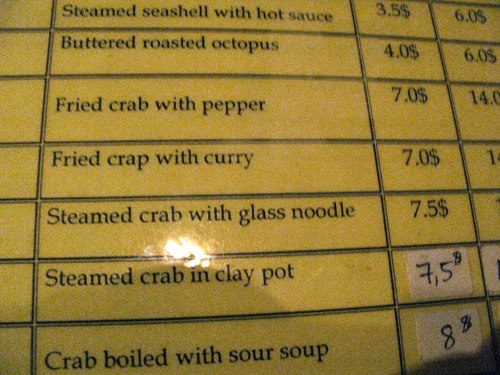Decision 2017 – should we be worried, and what can we do?
Two parliamentarians given a bloody hiding by hired goons outside the National Assembly in 2015. Sam Rainsy effectively in perpetual exile and Kem Sokha sacked as Assembly Vice President; his wife left to hide in her house as an enraged, local mob hurled bricks at the windows with police refusing to respond to her request for protection, and then his virtual house arrest at CNRP headquarters in Phnom Penh.
Taken collectively, the various incidents noted above — which all took place over a few weeks in 2015 and 2016 — suggested at the time a worrying trend of politically-motivated violence and agitation in Cambodia.
Just days away from the hotly contested local elections, the mood amongst many Khmer in the capital of Phnom Penh might be described as reserved antipathy at the political situation, and this has not been ameliorated by recent comments made by Prime Minister Hun Sen, the longest serving head of state in Asia–a fact which the Premier considers a badge of honor, rather than an indictment of the nation’s democratic record.
“An internal war will erupt,” the PM said with respect to the Cambodian National Rescue Party’s (CNRP) preference to replace key figures of the country’s military leadership in 2015.
“Change is not a game,” he explained with sovereign contempt in 2013 before the National Assembly elections of that year resulted in a Cambodian People’s Party (CPP) victory but with a smaller majority. “After changing Lon Nol to the Pol Pot regime, the genocide occurred.”
And just last week he doubled down on his forecast, saying that “war will happen” if the CPP loses the election and his family is persecuted by a victorious opposition. “Words can cause war if the CPP loses patience and goes to your homes and burns down your homes,” he added.
Prime Minister Hun Sen once famously placed a $5,000 bet on Manny Pacquiao to defeat champion boxer Floyd Mayweather and refused to pay up when he lost because he disagreed with the decision to award the fight to Mayweather on points. Does anyone believe he would simply hand the reigns over to the CNRP if he were to lose an election? The CNRP may or may not have the numbers to win either this week’s contest or the country’s next National Assembly elections scheduled for 2018. So the question posed here is should we, the expat community in Cambodia, be worried about violence up to and during the vote and, if so, what should we do?
The last National Assembly elections took place in July 2013, and while there was the occasional overturned car set on fire, the odd Vietnamese business torched, and sporadic clashes in the streets between angry demonstrators and the state security service, I never personally felt at risk as a white guy in his late-20s.
But the “culture of dialogue” promised after the CNRP gained Assembly seats in 2013 is firmly over. Tensions are bubbling at the surface and with just days to go until election day, there is nothing to suggest this will be mollified. Things can turn lugubrious very fast and the prospect for another round of violence in Cambodia is very real, whatever the outcome of Sunday’s polls and their implications for 2018.
I wouldn’t recommend a single, white female to wander around Stueng Mean Chey when the sun goes down and, likewise, there are certain steps–common sense steps–we can all take to avoid potential hot spots during election season:
1) If you’re a foreigner, avoid talking about politics with Cambodians. It is not our place to speak about Cambodian politics, and certainly not in public; it makes people very uncomfortable. For example, my Khmer landlady is one of these inimitable elder Cambodians who can never go without a smile, despite what they have probably seen in their lives. And yet, when a political topic came up unexpectedly one time in her presence, her smile quickly transitioned into a scowl of the most aesthetic objection imaginable, as if she had never been privy to a conversation so offensively incongruous.
Political arguments have ended friendships of mine back in my home country. However, it is our civil right to debate and engage in political discourse in (most) of our home countries in the West.
Here, we are living in a Third World, quasi-dictatorship, and we should be cognizant of the fact that we have little to no rights here. I do not discuss the corruption, land grabbing, logging, or any of the other litany of sociopolitical issues associated with the ruling party out in the open. Nor do I bring up the outrageous xenophobic sentiments occasionally expressed by members and supporters of the opposition, statements that many in the West would find totally repugnant and condemnable. Living here for awhile teaches you to bite your tongue and save face.
All of us love living in Cambodia (don’t lie to yourself) because of the many freedoms here that we as expats enjoy and which are disappearing in Western countries. Not to be unctuous, but I am grateful to be here and I never forget that. And so it is with a degree of mock supplication that I advise you not to rock the boat either.
2) Stay away from polling places. One of the biggest problems in 2013 was that many people went to sign their names and vote at the registered polling stations only to discover that someone had signed for them already and voted. I was in Steung Mean Chey on an unrelated matter during election day two years ago and saw a police truck get set ablaze; the anger I witnessed there was palpable and was in sharp contrast to the customary passiveness of the average Khmer you run into anywhere else. Ultimately I was never threatened, as the manifestations of outrage that day would be considered exiguous to electoral violence in other countries I could name. However, I would avoid any business on election day unless it is absolutely necessary.
3) It’s OK to take a holiday. My general rule of thumb is for every three months I spend in Phnom Penh, I “earn” one holiday for myself outside the town. This could be to the provinces or to one of the neighboring countries. I might recommend the latter during election season.
In the worst case scenario, we can all leave and go back to either our home countries or somewhere where the grass is greener. We aren’t stuck here like the locals will be if something analogous to 1997 happens again. And having said that, despite the regrettable actions which took place that year, only a handful of people lost their lives. While that is a shame, in Southeast Asia, it’s probably akin to coming out unscathed.
You look around the globe and see countries ablaze and the stars aligning for major international conflict on the immediate horizon. Don’t think it couldn’t happen here as you are reading this while sipping your iced latte at Browns.
We are not Cambodians, and only Cambodians should be able to determine their political future. It makes me sick to see the usual cast of pro-opposition, Western NGOs along with their partner hacks who write for the English language newspapers operating in the country continuously promote a message of neoliberal ideas and Western-styled democracy. These are the type of people who love to talk your ear off about the poor Cambodian children and Third World poverty as they bitch about the wifi on their Iphone 6S. Sure, we all want democracy but in some places in this world–and Southeast Asia is up there with the Mideast–the rapid transition which takes places during regime change can wreck the social order and create chaos.
In summary, yes, you should be keeping an eye out on the political situation. And you should also be keeping in mind George Santayana’s famous quote about those of us who forget their history because change, in Cambodia, is certainly not a game.





Great article, with some very astute advice.
A quasi-dictatorship !!!! Don’t think so.
Interesting article Tim. I am not an expat but have visited 10 times in 6 years and intend to continue. You make the case well for ‘knowing our place’ in the scheme of things. When you can up and off if things get difficult it does limit your credibility in local politics.